
Related
Topics
Guests
- Ian Millhisersenior fellow at the Center for American Progress Action Fund and the editor of ThinkProgress Justice. He is the author of the forthcoming book, Injustices: The Supreme Court’s History of Comforting the Comfortable and Afflicting the Afflicted.
The U.S. Supreme Court has heard arguments in a new challenge to the Affordable Care Act, or “Obamacare.” The Competitive Enterprise Institute, backed by the billionaire brothers David and Charles Koch, sued the government over an aspect of the law dealing with tax subsidies. The legal question before the court focuses on a four-word phrase in the Affordable Care Act, which says subsidies are available to those buying insurance on exchanges “established by the state.” Plaintiffs claim the wording does not include some 7.5 million people in 34 states who get their insurance through federal exchanges, after their states declined to run exchanges of their own. If the government loses the case, millions of people would lose the subsidies needed to help pay for private health insurance. Justices appeared sharply divide during Wednesday’s arguments, and a decision is expected by late June. We are joined by Ian Millhiser, who attended Wednesday’s court hearing. He is a senior fellow at the Center for American Progress Action Fund, editor of ThinkProgress Justice, and author of the forthcoming book, “Injustices: The Supreme Court’s History of Comforting the Comfortable and Afflicting the Afflicted.”
Transcript
NERMEEN SHAIKH: We turn now to the Supreme Court, which heard arguments Wednesday in another challenge to the Affordable Care Act, or “Obamacare.” If the government loses the case, known as King v. Burwell, millions of people would lose tax subsidies needed to help pay for private health insurance. The challenge was brought by the Competitive Enterprise Institute, which is backed by the Koch brothers. Inside the courtroom, justices appeared sharply divided. The White House warned of catastrophic damage if the court rules against the subsidies.
AMY GOODMAN: Well, for more, we go to Washington, D.C., where we’re joined by Ian Millhiser. He’s a senior fellow at the Center for American Progress Action Fund and the editor of ThinkProgress Justice. Millhiser is the author of the forthcoming book, Injustices: The Supreme Court’s History of Comforting the Comfortable and Afflicting the Afflicted. He attended Wednesday’s Supreme Court oral arguments in King v. Burwell.
Well, describe the scene inside the Supreme Court, Ian. But also, if you could explain just what this case is all about?
IAN MILLHISER: Sure thing. So this is really a case about whether or not the justices are capable of reading more than six words. The plaintiffs in this case hone in on these six words in the law—”an exchange established by the state”—and they claim that those words appear in a place which makes it the case that if you’re in one of the 36 states that has a federally run exchange, instead of one of the ones that is a state-run health exchange under the law, you do not get these tax credits. We’re talking about hundreds of billions of dollars’ worth of tax credits that help people pay for the law—or, that help people pay for insurance.
The problem with their theory is that the law is a lot more than six words long. The word “exchange” is defined in the law, and it’s defined in a way that deems state exchanges and federal exchanges to be the exact same thing. There are various provisions of the law that become absurd if you accept the plaintiffs’ reading of what those words mean. And then there’s this problem that if in fact the plaintiffs are right—and this came up a lot at oral argument—it could set off what’s called a death spiral, where it creates a shock to the insurance market that could potentially collapse those markets in many states, leaving people in the individual insurance markets unable to buy insurance at any price.
NERMEEN SHAIKH: Ian, could you actually explain how that would happen? What would the impact be of a decision against, in this case, on insurance companies and premiums?
IAN MILLHISER: Sure thing. So, these tax credits cover, you know, depending on what state you’re in, an average of two—and average of 60 to 80 percent of the average person’s premium. So, if this case goes south, you’ll see premiums go up 200, 300, 400, 500, even 600 percent in many states. Once that happens, healthy people start dropping out of the health insurance market, because their premiums have gone up so much, they can no longer afford their care. Well, when healthy people drop out of the market, the insurance companies no longer have enough revenue to cover the costs of their sick customers. So they have to jack up premiums even more. And when they jack up premiums, more people drop out, which causes premiums to go up more, which causes more people to drop out. That’s the death spiral that could potentially collapse the market.
And what was interesting yesterday is Justice Kennedy—there’s a doctrine which says that states cannot be subjected to unconstitutional coercion. They can’t be forced to do something under penalty of a terrible consequence. And Kennedy seemed to think that if the plaintiffs are right about how this law was written, forcing states to choose between setting up their own exchange or dealing with this death spiral is unconstitutional. And for that reason, I think that he is more likely than not going to vote with the government and say, “No, we’re not going to accept the plaintiffs’ reading, because that’s just—it’s too unconstitutional. It would coerce the states, and that’s not acceptable.”
AMY GOODMAN: I mean, it’s not as if they’re going back hundreds of years to try to figure out the history of how this law was passed, you know, to determine what is meant by the term “established by the state.” People debated this. They wrote about it. What about that legal history, the intent of those who wrote the law?
IAN MILLHISER: Right, there’s no question here what this law is supposed to mean. And you don’t even have to look at—you know, there is a brief that was filed by many members of Congress saying, “No, that’s not what we meant.” The plaintiffs, in their brief, called out former Senator Ben Nelson and claimed that Nelson wanted it to be this way. And Nelson wrote a letter saying, “No, that is not how I wanted it.” So there’s no question, this is not how the law was intended to work.
But again, you don’t need to look at, you know, these intentions. You don’t need to look what these members of Congress are saying. All you have to do is read the law. The word “exchange,” again, is defined in the law to say that any exchange, whether it’s run by the state or whether it’s run by the federal government, shall be deemed to be an exchange that is established by a state. And that’s really all you need to know. The word “exchange” is defined in the law. The law clearly says that state and federal exchanges are the exact same thing. And if these justices follow the law and they aren’t consumed by partisan politics, this should be an easy case.
NERMEEN SHAIKH: Well, I want to turn to the group behind the King v. Burwell case, the Competitive Enterprise Institute. The group’s website says this case, quote, “challenges an IRS regulation imposed under the Affordable Care Act, better known as Obamacare, that allows subsidies on both state and federally-established health exchanges. The IRS regulation violates the plain language of the law enacted by Congress, which gave states the choice to either set up such exchanges themselves or stay out of the program.” So could you explain what is the Competitive Enterprise Institute and what is their interest in this case?
IAN MILLHISER: Well, their interest is they don’t like Obamacare. You know, their interest is that they are opposed to this policy, and they want to use the Supreme Court as their agent in order to enact—in order to get rid of this policy they don’t like. Look, I mean, there’s a lot of right-wing groups in Washington, D.C. CEI, in a town riddled with conservative organizations, is a particularly virulent group. Their former board chair recently wrote a blog post where he compared the Affordable Care Act to the Holocaust. You know, think about that for a second. He compared giving health insurance to millions of people, so that they can live, to the Holocaust. So you’re dealing with some folks here who don’t really have the same perspective that many people have, and they’re hoping that there are five justices that are essentially willing to be their agents to enact an agenda that they couldn’t get through Congress and, you know, to engage in a very political, very partisan attack on President Obama’s chief accomplishment.
AMY GOODMAN: So, as we wrap up, Ian, The New York Times headline today, “At Least One Justice is in Play as Court Hears Health Case,” they’re talking about Anthony Kennedy.
IAN MILLHISER: Right.
AMY GOODMAN: Where this goes from here?
IAN MILLHISER: So I think it is more likely than not that the justices will reject this challenge. Kennedy, again, seemed to feel that if the plaintiffs are right, that would be unconstitutional, and so he said the court should avoid a construction of the law that is unconstitutional. Roberts, Chief Justice Roberts, was dead silent, but Roberts upheld the law three years ago, and this legal challenge is so weak. You know, Roberts is very conservative, but he’s also very smart. I think the most likely outcome is a six-to-three decision, with Roberts and Kennedy joining the court’s four liberals in order to uphold the subsidies. But it is still up in the air. We won’t know until the decision comes down. And, you know, obviously, it would be very, very frightening. We’re talking about an estimated almost 10,000 people will die every year if this case goes against the government.
AMY GOODMAN: Ian Millhiser, we want to thank you for being with us, senior fellow at the Center for American Progress Action Fund, editor of ThinkProgress Justice. His forthcoming book will be called Injustices: The Supreme Court’s History of Comforting the Comfortable and Afflicting the Afflicted.
This is Democracy Now! When we come back, we go to London to talk about the man who came to be known as Jihadi John. Stay with us.

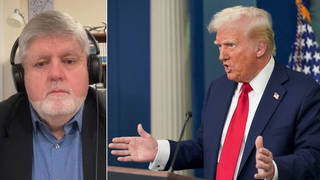
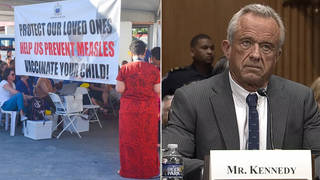
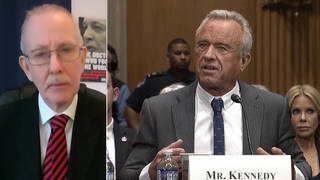
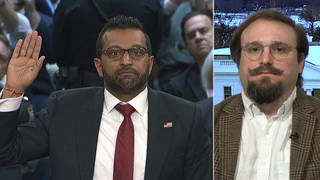






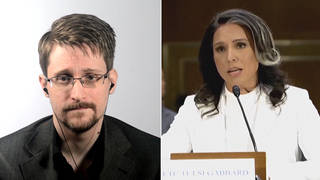
Media Options